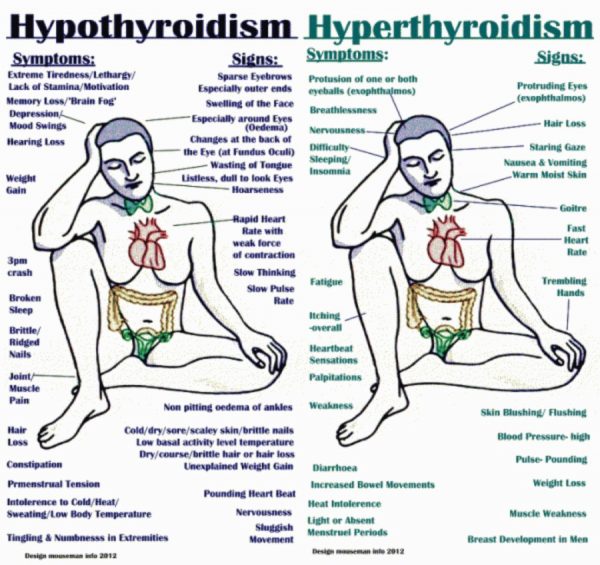The thyroid is an endocrine gland located in the neck. It secretes two hormones into the blood, such as triiodothyronine (T3) and thyroxine (T4). Moreover, these thyroid hormones are responsible for regulating the energy, metabolism and growth.
But, thyroid disorders are quite common nowadays. It has been estimated that 1 out of 20 people is prone to experience some type of thyroid disorder during their life. However, these disorders typically occur in women. Also, they may occur in men, children, and teenagers.
Types of Thyroid Disorders:
- Hyperthyroidism
- Hypothyroidism
They both are caused by thyroid hormone imbalance. In short, in case the thyroid gland produces excess or very low amount of the thyroid hormone, you can experience hyperthyroidism or hypothyroidism.
Specifically, hyperthyroidism is a common thyroid disorder, which occurs if the thyroid produces too much of this hormone. The most common symptoms of this condition include irritation, nervousness, anxiety, a rapid heart rate, diarrhea, sudden weight loss, heat sensitivity, and sleep disorders.
Hypothyroidism occurs in case the thyroid does not produce enough of this hormone. Additionally, the most common symptoms of the condition include fatigue, dry skin, weight gain, muscle pain, cramps, concentration difficulties, hair thinning, excess fluid in tissues, and cold sensitivity.
What’s more, if the thyroid gland starts functioning very hard, then it may lead to a large lump formation in the throat. Furthermore, it is a symptom of iodine deficiency, which is known as goitre.
Here Are the Main Culprits of Thyroid Disorders:
- Chronic stress
- Toxin overload
- Iodine deficiency
- Metal buildup
That’s not all, hyperthyroidism can be also triggered by the following conditions: Graves’ sickness, thyroiditis, or toxic adenomas.
On the other hand, hypothyroidism could be also caused by lithium or iodine overexposure, Hashimoto’s thyroiditis, or thyroid removal.
How to Prevent and Treat Your Thyroid Disorder Naturally:
– Eat Healthy
Proper nutrition plays a major role in treating thyroid problems. So, it is advisable to lower your intake of refined flours, processed and sugary foods, and elevate your intake of omega-3 fatty acids, iodine, selenium, and zinc to support good thyroid health.
– Manage Your Stress
Chronic stress results in adrenal exhaustion, thus increasing your risk of developing thyroid disorders. Hence, consider engaging in certain stress management programs and relaxing activities, such as breathing exercises, yoga, meditation, walks in nature, etc. These activities can lower your tension as well as promote calmness and a general sense of well-being.
– Exercise Regularly
You can promote excellent function of your thyroid gland by exercising on a regular basis. In this way, you can promote optimal production of this hormone.
– Detoxify Your Body
You can also use sauna session or a heat therapy to treat your thyroid disorder because they can remove any harmful toxins and detoxify your body.
– Take High-Quality Nutritional Supplements
Prior to taking any nutritional supplement, consider consulting a physician or nutritionist. But, there are many powerful nutritional supplements that can help in the treatment of any thyroid problem.
– Use Thyroid Hormone Replacement Therapy
You should also ask your doctor about some thyroid hormone replacement therapy because it may help prevent or treat these disorders.
– Prevent the Underlying Causes of Thyroid Problems
You can prevent any thyroid disorder by preventing the root causes of the issue. So, it is advisable to manage stress, and treat nutritional deficiencies, allergies, and cleanse your body from toxins and heavy metals. Also, reduce your consumption of gluten and dairy products in order to prevent digestive distress.
Source: www.healthyfoodhouse.com
